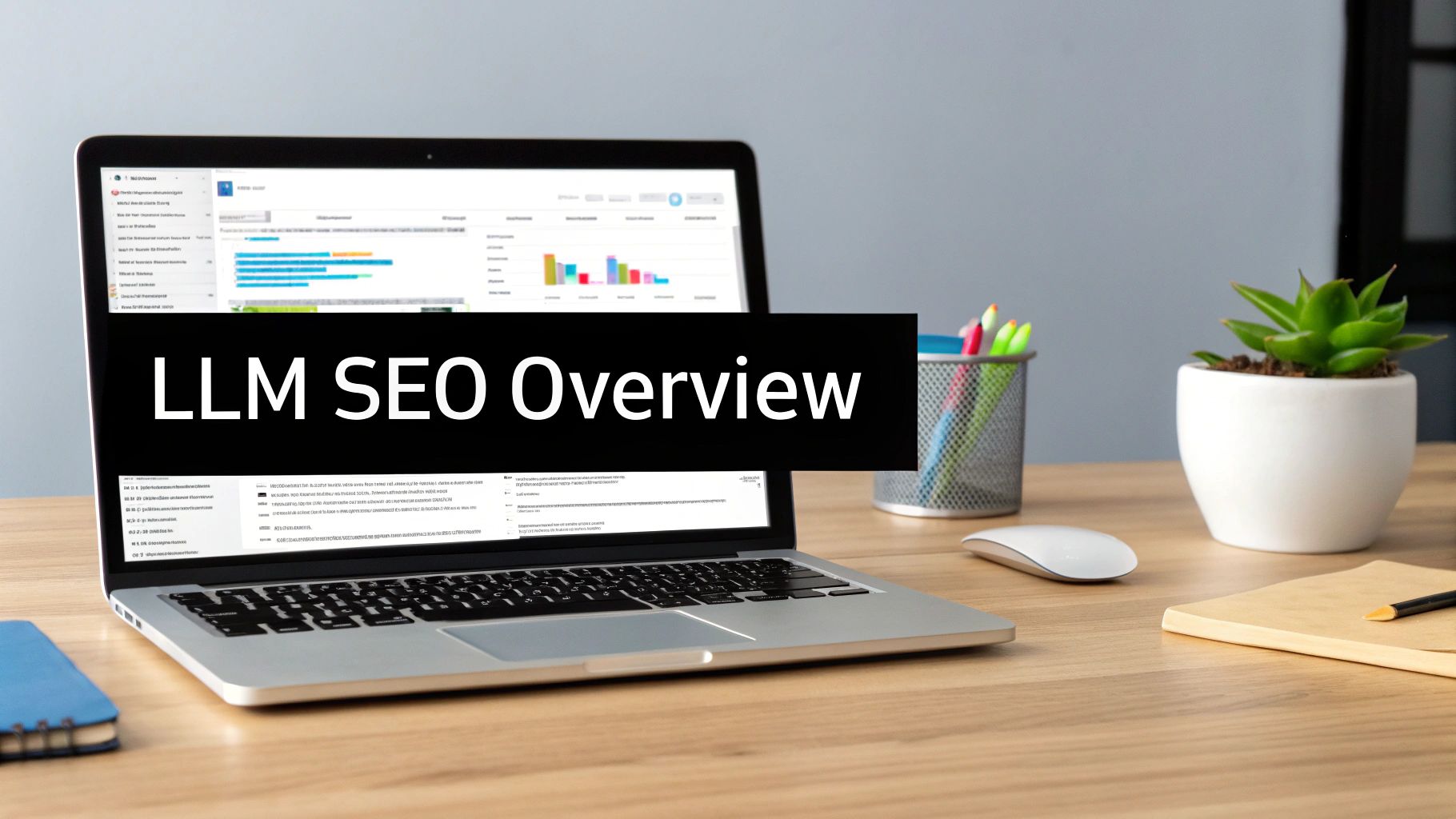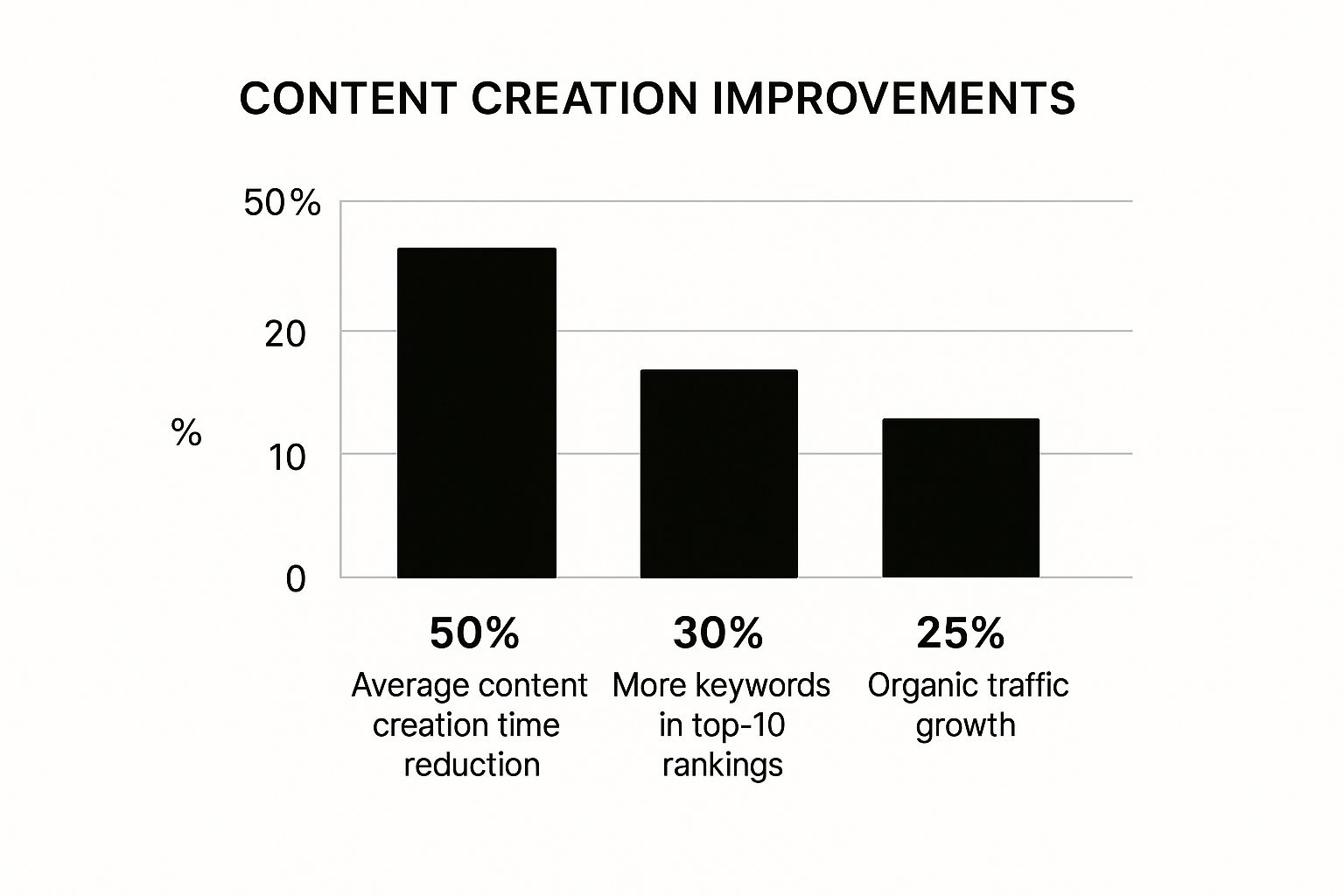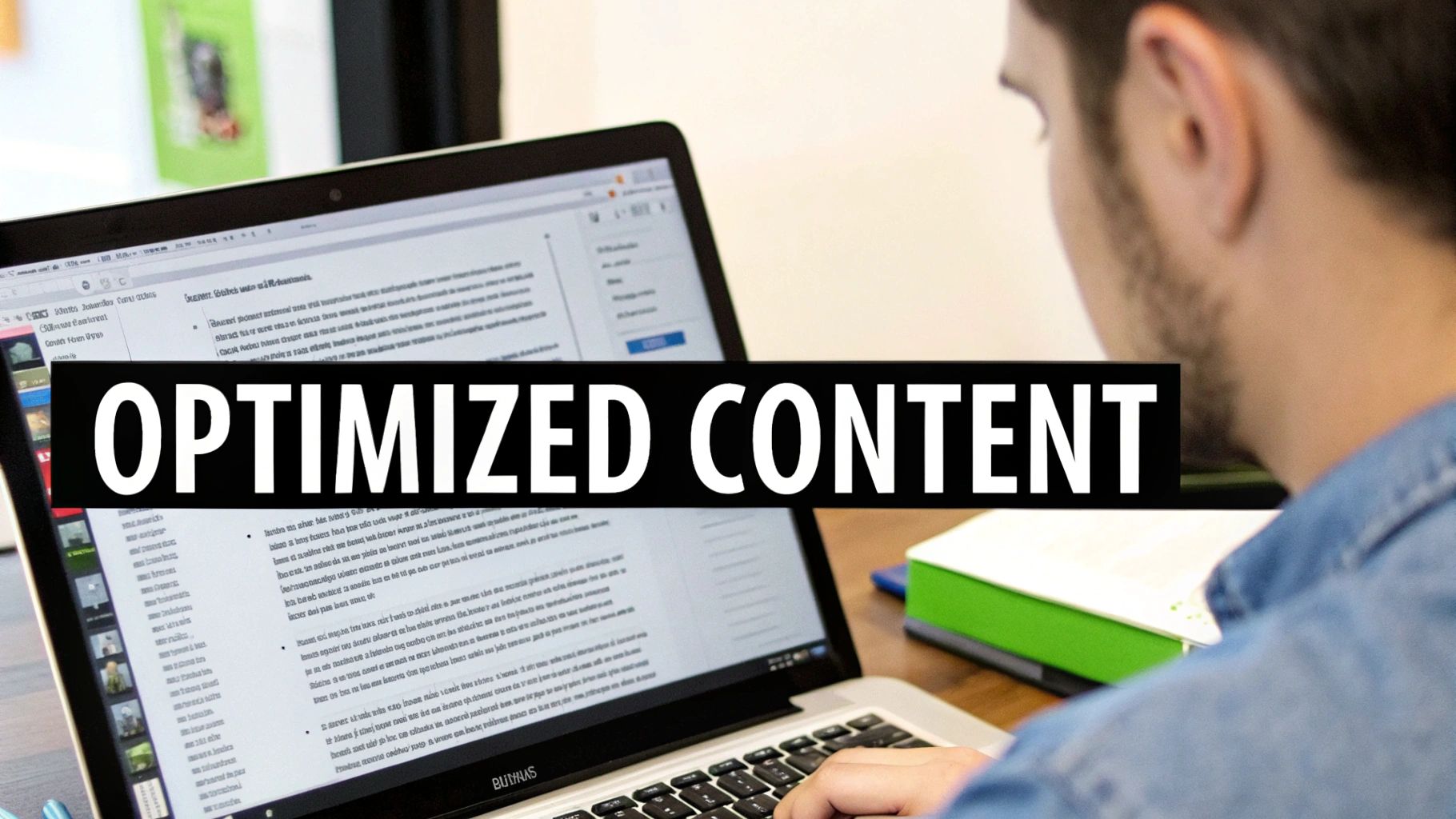LLM SEO Mastery: Your Complete Guide to AI-Optimized Content
Understanding The LLM SEO Revolution (And Why It Matters)

Search engine optimization (SEO) has evolved beyond keywords and backlinks. The emergence of Large Language Models (LLMs), such as ChatGPT, is transforming how we search for information online. This presents exciting new opportunities, as well as critical challenges, for businesses aiming to boost their online presence. Grasping this new paradigm is key to staying competitive.
The Rise of AI-Powered Search
LLMs are having a profound impact on SEO, and their influence is expanding rapidly. The growing use of AI chat systems, for instance, is reshaping user search behavior. Experts foresee a notable shift, projecting that 10-15% of searches will transition to generative AI queries by 2026.
This trend is driven by the widespread adoption of tools like ChatGPT, which amassed over 100 million users within months of its release. This indicates a significant move toward conversational, AI-driven information retrieval. For more in-depth statistics, check out this resource: LLM SEO Insights.
Optimizing solely for traditional search engines like Google is no longer sufficient. Businesses now need to consider how their content appears within AI-generated responses. This necessitates a fresh approach to content creation, emphasizing comprehensive and accurate information that LLMs can readily process and utilize.
Adapting to the Changing Landscape
AI-powered search introduces the concept of zero-click searches. Users frequently obtain complete answers directly within the search interface, reducing the need to click through to websites. This directly impacts website traffic and requires a strategic shift in SEO. Focusing on brand visibility and building authority within AI responses becomes essential.
Furthermore, content structure plays a vital role. Content must be organized in a manner that LLMs can easily parse and present. This involves using clear headings, concise paragraphs, and semantically related keywords. This method not only improves AI readability but also benefits users who do click through to your website.
The Future of Search Is Here
The integration of LLMs into search represents a significant evolution in how we find information online. Adapting to these changes is paramount for sustained success. Businesses need to adopt LLM SEO strategies to maintain visibility and competitiveness.
Investing in tools and techniques that optimize content for AI platforms will be a key differentiator moving forward. This new era of search prioritizes brands that offer accuracy, comprehensive information, and an excellent user experience.
How AI Overviews Are Reshaping Search Behavior

AI overviews in search results are changing how people discover information. These snippets do more than tweak click-through rates; they guide the entire browsing session. Content creators and marketers must understand these patterns to stay competitive.
The Rise Of Zero-Click Searches
Users now expect answers right away. Zero-Click Searches mean AI overviews display concise summaries in the results, often removing the need to click through.
For a basic recipe query, an AI overview might list ingredients and steps without opening another page. This instant response satisfies the need for quick information.
Mobile use drives much of this trend. With 63.31% of web traffic coming from mobile devices as of March 2026, users favor short, digestible content. Plus, AI overviews by Google have cut organic click-through rates by around 20–40%. Find the full breakdown in the Digital Silk SEO Statistics.
Adapting Content For AI Overviews
To maintain visibility, content must work well inside AI summaries. This calls for LLM SEO tactics alongside classic optimizations.
Try these approaches:
- Structure with clear headings and subheadings so AI can parse your content hierarchy.
- Use conversational keywords and long-tail phrases that mirror real user queries.
- Provide direct, complete answers under each heading to help models extract key points.
Maintaining Visibility And Engagement
Even as click-through rates change, brand authority and engagement remain vital. Aim to become a trusted source that AI overviews reference.
Consider these tactics:
- Develop in-depth, topic-specific analysis to showcase your expertise.
- Include accurate data points and real-world examples to boost credibility.
- Foster recognition by consistently appearing in AI-generated summaries.
You might also explore the Guide to Mastering Generative Search Optimization. By aligning content with AI overviews and reinforcing your brand presence, you can adapt to new search behaviors and keep your audience engaged.
Seeing AI overviews as an opportunity rather than a threat helps you reach more readers and reinforce your leadership in the field. A proactive LLM SEO approach is key to staying ahead as search habits evolve.
The Data Behind LLM SEO's Growing Impact

This infographic illustrates the potential of integrating Large Language Models (LLMs) into your SEO strategy. It specifically highlights improvements in content creation time, keyword rankings, and organic traffic. By using LLMs, you could see a 50% decrease in content creation time, a 30% rise in top-10 keyword rankings, and a 25% jump in organic traffic.
These gains showcase the ability of LLMs to improve content workflows and boost search visibility. This translates into significant time and resource savings, allowing teams to focus on strategy.
The increasing influence of LLM SEO is clear, and the data shows compelling trends. For instance, Google saw a 21.6% increase in overall search volume between 2023 and 2024. This highlights the continued importance of search engines for finding information, even with the rise of AI chat platforms.
At the same time, ChatGPT handles roughly 37.5 million prompts daily, compared to Google's 14 billion daily searches. This difference points to distinct user behaviors. Google remains the primary tool for general information, while ChatGPT serves more specific, conversational queries. For more in-depth statistics on AI and SEO, check out this resource: AI SEO Statistics.
AI Tool Adoption and User Behavior
The rise of AI tools directly impacts user behavior. More people are using conversational AI, spreading their information searches across multiple channels. This makes it crucial for businesses to understand where and how users are searching. This understanding is key to optimizing your presence across various platforms.
The Intersection of Search and AI
This shift requires us to look at how traditional search engines and AI-powered platforms interact. Consider Sellm.io, a platform focused on GEO and brand monitoring in AI environments. It helps businesses improve their visibility in LLM responses from platforms like ChatGPT, Claude, and Perplexity.
Tools like Sellm.io are crucial in the changing search landscape. Simply ranking high on Google isn't enough anymore. Understanding how users search across different platforms is essential for effective optimization. Focusing on the platforms where your target audience is most active is now a strategic necessity.
Key Metrics in the AI-Driven Search Landscape
Using the right metrics is essential in the AI-driven search world. While traditional metrics are still important, they need to be considered alongside AI-specific indicators. This means looking at how your content appears in AI-generated responses, the accuracy of AI summaries, and user engagement with your content within these platforms.
To understand the differences between traditional and LLM-focused SEO, let's look at a comparison table.
The following table, "Traditional SEO vs LLM SEO: Key Differences," offers a comprehensive comparison of optimization strategies, metrics, and best practices between traditional search engine optimization and LLM-focused approaches.
| Aspect | Traditional SEO | LLM SEO | Impact Level |
|---|---|---|---|
| Primary Focus | Ranking on search engine results pages (SERPs) | Visibility and citation within LLM responses | High |
| Keyword Strategy | Targeting specific keywords | Focusing on conversational queries and topics | High |
| Content Optimization | On-page elements, keyword density, backlinks | Content structure, clarity, and factual accuracy | High |
| Measurement | Keyword rankings, organic traffic, click-through rates | Brand mentions, citations in LLM responses, AI visibility score | High |
| Technical Optimization | Site speed, mobile-friendliness, crawlability | Data structuring for LLM comprehension | Medium |
This table highlights the shift in focus from traditional keyword targeting to a more conversational approach in LLM SEO. It also emphasizes the importance of content structure and factual accuracy for LLMs to properly understand and cite your content. Furthermore, measuring success shifts from traditional metrics like keyword rankings to newer metrics such as brand mentions and citations within LLM responses.
By considering these differences, businesses can better adapt their SEO strategies for the evolving search environment. Benchmarking your performance against industry standards in these new areas gives valuable insights into your LLM SEO success. This comprehensive approach ensures a thorough evaluation of your SEO performance across both traditional and AI-driven channels. By accurately measuring progress, you can refine your strategies and take advantage of the opportunities presented by LLM SEO.
Content Optimization Strategies That Actually Work

Creating content that performs well with AI-driven search requires a shift in our approach to writing and structuring information. The old tactic of keyword stuffing is no longer effective. AI now prioritizes providing real value to users, focusing on depth and context. This means we need to create informative content that these complex algorithms can easily understand.
Crafting AI-Friendly Content
A key aspect of LLM SEO is creating content that AI systems can readily process. This means using clear, concise language, avoiding jargon, and structuring information in a logical manner. Imagine you are explaining something to a computer: the clearer your explanation, the better the computer understands.
Descriptive headings and subheadings, for instance, help AI quickly grasp the main topic of each section. This structured approach not only improves AI readability, but also makes the content easier for users to scan and understand. Using conversational keywords and long-tail phrases can also boost your content's visibility.
Building Semantic Relevance
AI models analyze the semantic relationships between words and phrases, moving beyond simple keyword matching. Building semantic relevance is therefore essential for LLM SEO. Think of it as building a network of interconnected ideas. A greater number of connections results in a stronger overall structure.
You can achieve this by incorporating related keywords and phrases throughout your content and providing comprehensive coverage of the topic. Instead of focusing on individual keywords, create content that thoroughly explores a subject from different perspectives. This approach not only satisfies AI systems but also creates a richer, more informative experience for users. In fact, content optimized for AI using semantic keyword strategies and thorough topic coverage has shown a 73% increase in visibility in AI-generated responses and 2.4x more user engagement. You can find more details on this here.
For a deeper dive into optimizing your content for AI-driven search, check out this article: How to Master AI SEO.
Improving Content Depth and Readability
Content depth is another crucial factor in LLM SEO. AI systems favor comprehensive content that thoroughly addresses user queries. However, readability is equally important. It's a delicate balance: providing detailed information without overwhelming the reader.
Achieving this involves using clear and concise language, breaking complex topics into smaller, manageable pieces, and incorporating visuals such as images and videos to illustrate key points. These strategies make your content more accessible to both AI and human readers, ultimately improving user engagement.
Structuring Information for AI Discoverability
How you structure your content can greatly influence its discoverability by AI systems. A well-organized site architecture allows AI crawlers to easily navigate and understand your content. Think of it like organizing a library. The easier it is to find books, the more likely people are to borrow them.
Use a clear hierarchy of headings and subheadings along with a logical sitemap. This provides clear signals to AI, improving its ability to extract relevant information. Adding structured data markup can also enhance AI's understanding of your content. This technical aspect is often overlooked but plays a significant role in LLM SEO.
Technical Implementation That Makes The Difference
Creating top-notch content is just the first step. For truly effective LLM SEO, a robust technical foundation is crucial, yet often gets overlooked. This section dives into the essential infrastructure elements that can significantly impact your AI optimization efforts.
Enhancing AI Understanding With Structured Data
Schema markup and structured data are key to helping AI grasp your content. These tools provide clear signals about the meaning and context of your information. Think of them as labels on ingredients in a recipe. Those labels help both a chef and a cooking app understand how each component contributes to the dish.
Similarly, schema markup allows LLMs to interpret your content more accurately, extracting key facts and presenting them meaningfully. This increases the likelihood of your content appearing in AI-generated responses.
Optimizing Crawl and Index Procedures
Another vital aspect of technical implementation is making it easy for AI systems to crawl and index your content. Ensure your website is accessible to AI bots and structured for easy navigation.
This includes optimizing site speed, employing a logical site architecture, and providing clear navigation. Like a well-organized library, a well-structured website allows AI to quickly find and index the information it needs.
Content Syndication and API Optimization
Content syndication for AI platforms is an emerging field in LLM SEO. It involves distributing your content to platforms used by LLMs as knowledge sources. Wider distribution boosts your content's visibility and the chances of being cited by AI.
For instance, sharing summaries or excerpts of your articles with relevant AI platforms can improve understanding and referencing. Also, optimizing your APIs for AI integration allows other platforms and tools to use your content more effectively. Learn more in our article about How AI-Driven Analytics Can Transform Your SaaS.
The Power of Structured Data for Discoverability
Structured data is essential for enhancing discoverability in AI-driven environments. By offering clear, concise information, you empower LLMs to understand, categorize, and recommend your material. This gives your content a significant advantage in the competitive landscape of AI-generated answers.
Automation and Scalability in LLM SEO
Automating and scaling your LLM SEO is vital for maintaining consistent quality across a large content portfolio. Several tools and frameworks can streamline these processes, saving you time and resources.
Here are some areas ripe for automation:
- Content generation: Automate outlines or summaries with LLM tools.
- Schema markup implementation: Utilize tools to add schema markup automatically.
- Performance tracking: Monitor key LLM SEO metrics with analytics dashboards.
Implementation Checklist and Troubleshooting
Effective LLM SEO implementation requires a series of technical steps and ongoing monitoring. The table below, "LLM SEO Implementation Checklist," provides a comprehensive overview of the key areas to focus on during this process, covering technical requirements, content optimization tasks, and performance monitoring.
To effectively implement LLM SEO, utilize this comprehensive checklist:
| Task Category | Specific Action | Priority Level | Tools Needed |
|---|---|---|---|
| Technical Setup | Implement schema markup | High | Schema Markup Generator |
| Content Optimization | Optimize existing content for LLM SEO | High | AI Writing Assistants |
| Content Syndication | Explore AI content platforms | Medium | Syndication Tools |
| API Integration | Ensure API compatibility with AI systems | Medium | API documentation |
| Performance Monitoring | Track LLM SEO metrics regularly | High | Analytics Dashboards |
Troubleshooting is also critical. Common issues include incorrect schema implementation, API integration difficulties, and inaccurate data reporting. Addressing these issues proactively ensures a smooth LLM SEO strategy.
Measuring Success In The New Search Landscape
Traditional SEO metrics like keyword rankings and click-through rates only tell part of the story in the age of LLM SEO. Relying solely on these measurements can lead to inaccurate conclusions and ineffective strategies. This section explores how to comprehensively track and analyze the true impact of your LLM SEO efforts.
Adapting Attribution Models for AI-Driven Traffic
Understanding where your traffic originates is fundamental to any SEO strategy. With the rise of AI-powered search, traditional attribution models need to adapt. The user journey is becoming more complex, with interactions happening across multiple platforms and devices.
For example, a user might start by asking a question using an AI chat system like ChatGPT, then refine their search on a traditional search engine like Google before finally landing on your website. Accurately tracking this multi-step process is essential.
We need to attribute value appropriately to both the AI interaction and the subsequent search engine query. This requires implementing advanced analytics tools, like Google Analytics, and setting up clear tracking mechanisms that capture the entire user journey. By understanding these complex pathways, you can optimize each touchpoint for maximum effectiveness.
Emerging Metrics in AI Search Environments
New metrics are emerging that are specific to AI search environments. Brand mentions within AI-generated responses, for example, are a key indicator of visibility and authority. This metric measures how often your brand is cited as a source of information by LLMs.
Additionally, the accuracy of AI summaries of your content is crucial. Inaccurate summaries can misrepresent your brand and deter users from clicking through. Tracking these nuances helps refine content to align with AI interpretations and improve overall SEO performance.
However, correlating these emerging metrics with actual business outcomes is crucial. Visibility in AI responses is valuable, but it must ultimately translate into tangible results. Connecting these metrics to leads, sales, or other key performance indicators (KPIs) demonstrates the real-world impact of your LLM SEO efforts.
Companies using comprehensive LLM SEO measurement frameworks are seeing significant improvements in their ROI tracking and decision-making speed. For example, these companies report 156% better ROI tracking accuracy and make optimization decisions 3.2x faster compared to those relying solely on traditional metrics. Learn more about this topic here.
Reporting LLM SEO Performance
Communicating the value of LLM SEO to stakeholders who may not be familiar with the nuances of this new landscape is vital. This requires clear, concise reporting that focuses on the most relevant metrics and their impact on business objectives.
Using dashboards that visualize key metrics, such as brand mentions, AI summary accuracy, and conversion rates, can effectively communicate the effectiveness of your strategy. These dashboards should provide actionable insights, highlighting areas for improvement and demonstrating the ROI of your LLM SEO efforts.
Additionally, regular reports that connect these metrics to business outcomes provide a compelling narrative of progress and value. Clear communication ensures everyone understands the importance and impact of LLM SEO.
Data-Driven Decision Making for Growth
Effective LLM SEO relies on data-driven decision making. Continuously analyzing performance data allows you to identify what's working, what's not, and where to focus your optimization efforts.
This iterative approach ensures that your LLM SEO strategy remains aligned with the evolving search landscape and delivers maximum impact. Using data to inform decisions, from content creation to technical implementation, is essential for staying ahead of the curve and driving real growth.
By embracing a data-centric approach, you can ensure that your LLM SEO strategy adapts to the dynamic nature of AI-driven search. This will allow you to continually refine your approach and maximize your results.
Want to take control of your brand visibility in the age of AI? Sellm.io is a platform specializing in GEO and brand monitoring within AI environments. Optimize your visibility and appear in responses from LLMs like ChatGPT, Claude, and Perplexity. Visit Sellm.io today to learn more.
